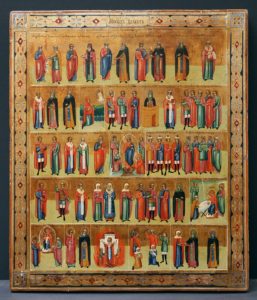Thoughts on Sunday’s Lessons for July 7, 2019
First Reading (Track One): 2 Kings 5:1-14
Abraham, the patriarch of the Israelites, was born in Aram in Mesopotamia. By the time of Israel’s kings, though, Aram and Israel had become bitter enemies.

The Synaxis of the Seventy Apostles, Russian Orthodox icon, late 19th century. (Click image to enlarge.)
But then the powerful Aramean general Naaman contracted leprosy, a terrible and disfiguring disease that rendered the sufferer unclean, cut off from their community. That was reason enough for Naaman to dismiss national rivalry and follow his Israelite servant’s advice to go to Israel’s prophet Elisha for a cure. In Sunday’s Track One first reading, we hear how Elisha added insult to injury by sending out a mere servant to give Naaman a ridiculous sounding prescription to go wash his body in the Jordan river. Fortunately for Naaman, his servants came to the rescue again, calming his rage at Elisha’s disrespect. It couldn’t hurt to try, they advised … and behold, Naaman was cured.
First Reading (Track Two): Isaiah 66:10-14
Our Track Two first reading takes us to the final chapter of Isaiah. The people have returned from exile to Jerusalem. They were full of joy at the return to their beloved city, but it lay in ruins; they faced the daunting labor of rebuilding the city and constructing a new temple. Still, the prophet declares, it is a time to rejoice and a time to heal. God will shower prosperity on the city, and, in beautiful language envisioning God as a loving mother, God will nurse and carry the people as a mother comforts her child.
Psalm: (Track One): Psalm 30
What an appropriate Psalm to follow Naaman’s healing! This hymn of thanksgiving sings out gratitude to God for recovery from a grave illness. Then it celebrates the gifts of God that may bring even more joy: ending the sadness and depression that so often accompanies illness … turning the weeping of those long dark hours of night into the celebration that comes at dawn … and turning the mourning of sickness into the dancing of health.
Psalm (Track Two): Psalm 66:1-8
Echoing the theme of trust in God’s protective power that we heard in the Isaiah reading, the Psalmist calls on all the earth to be joyful in God and sing the glory of God’s name. Recalling how God protected the people of Israel escaping slavery in Egypt by turning the sea into dry land, we sing out in full voice, making our voices heard in praise of the God who protects us.
Second Reading: Galatians 6:(1-6), 7-16
We have reached the end of Paul’s letter to the Christian community in Galatia in Asia Minor. Throughout the letter Paul has consistently argued that Christ’s message is universal – for all humankind – Jew and Gentile, man and woman, slave and free. Writing from far away, he has stood strongly, sometimes angrly, against the arguments of opponents who tried to persuade the Galatians to follow a more exclusive way. Paul’s final response clearly echoes Jesus’ message: “Bear one another’s burdens, and in this way you will fulfill the law of Christ.” In other words, follow Jesus by loving your neighbor as yourself.
Gospel: Luke 10:1-11, 16-20
In last week’s Gospel, we saw Jesus beginning his final journey toward Jerusalem, setting his face in the direction of the cross and telling his disciples in no uncertain terms not to tarry. Now Jesus organizes an advance team of seventy witnesses to go on ahead, telling residents in villages along the way that the Kingdom of God has come near. Those who reject them, like the Samarian villagers in last week’s Gospel, are rejecting Jesus; They deserve to be left behind like the dust shaken from the apostles’ feet. Those who welcome them are welcoming Jesus himself. Soon the disciples return, full of joy: In Jesus’ name, they have healed and even cast out demons.
